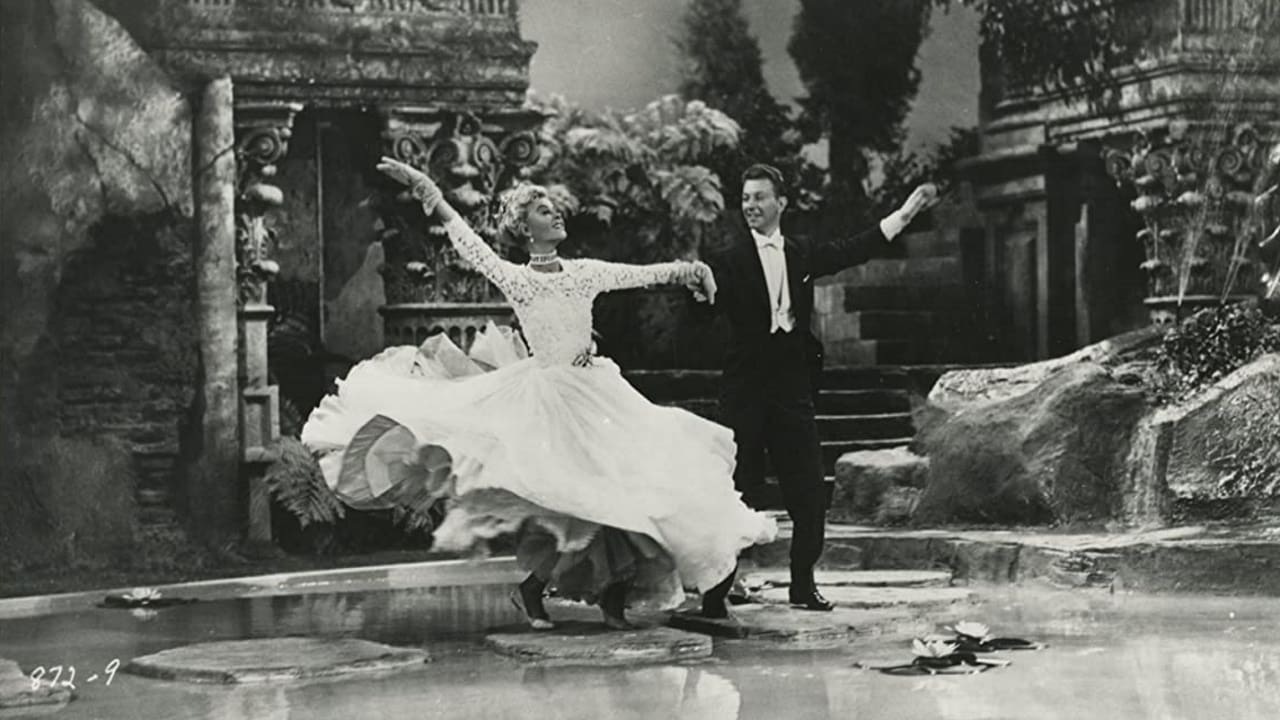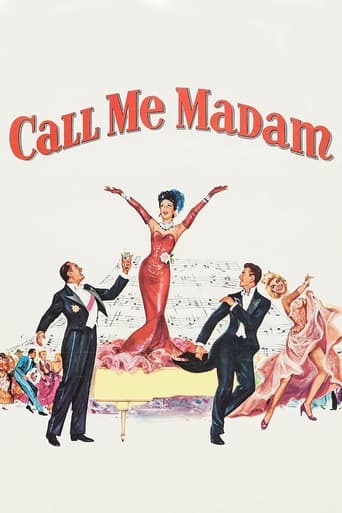

Call Me Madam is an excellent film, that I don't think is as appreciated as much as it should be. One of the film's main merits is that it is beautifully designed, with stunning cinematography, and Ethel Merman's dresses especially were to die for. The only things that let it down that let it down were its length and that one or two scenes could have simplified. However, these are fully compensated by the marvellous Irving Berlin songs and the dazzling choreography, evident in Donald O'Connor and Vera Ellen's dance routines. Now for the performances-Ethel Merman lends her big brassy personality to the character of Mrs Adams and does a highly commendable job. Whether she gave the best performance of the film is up for debate, personally I think not, for Donald O'Connor is a sheer delight as her assistant, and Vera Ellen looked beautiful and danced a dream. Though special mention should go to George Sanders as Cosmo Costantine, who not only shone with his charm and charisma, but also his singing was absolutely beautiful. Overall, a very well done musical, where the performances, songs and choreography shine through considerably, and fully compensate for the film's minor flaws. 8/10 Bethany Cox
... View MoreAs I’ve often said, the Musical is far from my favorite genre – however, whenever I come upon a well-regarded example, I don’t mind all that much checking it out; this was the case not too long ago with THE PAJAMA GAME (1957) and, again, now with this Fox extravaganza.Incidentally, every studio seemed to have its own particular style with respect to this genre – until the heyday of the sprawling filmizations of Broadway successes came along; actually, this one belongs to the latter category but it came at a relatively early stage – so that the treatment accorded it is still very much linked with the studio’s standard formula. Now, the Fox musicals (or what little I’ve seen of them) were among the more garish yet traditional – that is to say, unimaginative – to come out of Hollywood; this one, however, had the distinction of an Irving Berlin score as well as the added treat of a Ruritanian setting (bearing reasonable comparison with the equivalent work of the great Ernst Lubitsch).CALL ME MADAM, then, is best-known for providing brash entertainer Ethel Merman with her most significant role as an American hostess appointed Ambassador to the tiny duchy of Lichtenburg; the actress’ qualities are, perhaps, something of an acquired taste – but there’s no denying that the part fits her like a glove. Still, the talent supporting her is certainly not to be scoffed at: the film, in fact, showcases young leads Donald O’Connor and Vera-Ellen (who dance as well as sing) – he appears as Merman’s press attaché who falls for his pretty but impossibly thin co-star, a princess of the impoverished country promised in a marriage of convenience to Helmut Dantine’s military hero; Merman herself shares an unlikely romance with Foreign Minister George Sanders (the famously world-weary actor even gets to sing – modestly and in a deep, heavily-accented voice – on a couple of occasions!) while, at the same time, being pursued by Finance Minister Walter Slezak.Some of the plot complications/contrivances – involving political intrigue, romantic rivalry, secret trysts, misunderstanding and sacrifice – are so typical as to be wholly predictable, making the film’s not inconsiderable 114-minute duration somewhat long drawn-out (with even a number of the songs being reprised). That said, Berlin’s music and lyrics (and the performers’ rendition of them) are a delight – as is, surprisingly, much of the dancing (one of which occurs in the cellar of the palace[!], but especially O’Connor’s energetic drunken antics in a tavern incorporating a xylophone and a set of balloons a' la Fred Astaire).Incidentally, Merman, O’Connor and director Lang (a regular – albeit impersonal – exponent in the field) would be re-united the next year for THERE’S NO BUSINESS LIKE SHOW BUSINESS (1954), a showbiz musical revolving around a clutch of Berlin hits; for the record, this film is shown ad nauseam on TV (even locally)…but which, given the reservations I mentioned earlier about the Fox style, I’ve never bothered to watch (a situation I perhaps ought to remedy now on the strength of my generally favorable appraisal of CALL ME MADAM itself)!
... View MoreEthel Merman's overly-jovial, happily impersonal, maniacally spirited stage persona didn't always translate well to the silver screen (she was accused of projecting too big, as was Carol Channing). She certainly had some worthwhile movie opportunities however, this bright musical from Fox--modeled on the career of Perle Mesta--being one of them. Merman plays a Washington, D.C. hostess who is appointed U.S. Ambassador to Lichtenberg by her good friend Harry Truman, whom she telephones once in a while to check up on. Farcical, frantic and thoroughly insincere, the picture is still a marvel to behold as seen in unreal Technicolor (looking like 20 different flavors of Jell-O). Finger-snapping Merman is a hoot in her duet with lackey Donald O'Connor ("Your heart goes pitter-patter/I know just what's the matter..."), although Ethel never really adjoins herself to anybody else: she's intent on towing this ship fully on her own steam. It's a snug, entertaining concoction, though one which is apt to amusingly perplex and frazzle those unfamiliar with Merman's impertinent charm and gimme-some-elbow-room gusto. **1/2 from ****
... View More"Call Me Madame" is a musical that desperately wants you to love it. At times that love is genuine at other times it seems forced. Ethel Merman stars as "the hostess with the mostest" Ambassador to Luxemburg (name). She's bold, gregarious, irrepressible, manic, enigmatic and electrifying in spots. But 2 hours of Ethel is like 20 minutes in a wind tunnel; it's exhausting! Yes, the Irving Berlin score will have you tapping and humming away with pleasure, and, yes, the supporting cast of Vera Ellen, Donald O'Connor and George Sanders are all welcome additions that compliment the divine Ms. Merman. But they are mere appendages to her performance and are given so little to do that without Ethel there really wouldn't be a show. That aside, Merman proves why she was such a powerhouse on the live stage. She's like the female Bert Lahr (the cowardly lion from "The Wizard of Oz" for those who might otherwise not know to whom I am referring). She bounces from one emotion to the next, manically sucking up the atmosphere and expelling all things Merman in its place. Is she intoxicating?Suffocating is a more accurate assessment, but engaging nonetheless. Just make sure you've had your morning coffee first! Okay, make it two! TRANSFER: A respectable transfer from Fox. Full frame, as originally seen, with rich, vibrant Technicolor, solid blacks and excellent contrast levels. Digital anomalies are rare, pixelization being of the greatest concern, for a picture that is overall quite smooth and satisfying, if somewhat softly focused from time to time. Age related artifacts are present throughout but they do not distract from your viewing enjoyment. The audio has been remastered to stereo but remains something of a muffled disappointment, particularly in the songs. EXTRAS: A wonderful audio commentary and precious little else. BOTTOM LINE: Tackle the exuberant Ms. Merman but only if you dare!
... View More